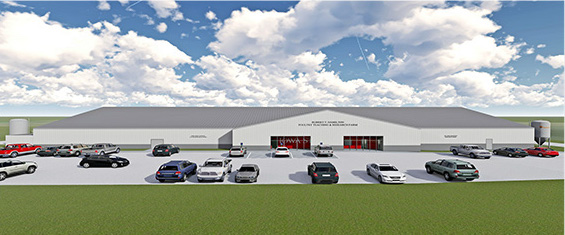
Second Century of Poultry Excellence
Not everyone is aware of Iowa’s place at the forefront of the poultry industry: In fact, Iowa is the number one egg producer in the nation, exceeding the second and third largest producing states combined.
To support this key industry, Iowa State University has long been a leader in poultry expertise. For over a century, university curriculum has included a focus on layer and poultry production. And, Iowa State boasts one of the world’s strongest research programs in poultry genetics, breeding, nutrition and management.
The Robert T. Hamilton Poultry Teaching and Research Farm will build on these strengths. In late 2019, the new facility will be dedicated, replacing the Iowa State University Poultry Science Farm south of campus, combining several outdated buildings into one state-of-the-art space.
The new facility will support key areas such as genetics, breeding, nutrition, air quality and environment control. It will include classrooms, a hatchery and a poultry nutrition space. An atrium and public viewing area will welcome visitors of all ages to participate in educational tours and learn about current commercial layer production methods.
Students and scientists from across the university and from the USDA’s Agricultural Research Service will use the new spaces. The farm is expected to become a destination for continuing education related to extension and outreach and for state licensing requirements by providing professional training to help the industry respond to emerging issues and maximize opportunities.
“The Hamilton Poultry Teaching and Research Farm will be a modern facility where we’ll begin writing the next chapter of Iowa State poultry science history,” says Daniel J. Robison, holder of the Endowed Dean’s Chair in the College of Agriculture and Life Sciences. “It will ensure we can provide the best hands-on education for students and the infrastructure to pursue new scientific discoveries.”
The project, which broke ground in 2018, will be built solely through support from donors. Thanks to a lead gift from the Robert and Arlene Hamilton Charitable Foundation, the farm will be aptly named in honor of Iowa Falls farmer Robert Hamilton. Hamilton, together with his wife, Arlene, built a successful poultry and hog operation and are considered pioneers of the modern layer chicken industry.
The Iowa Egg Council also provided substantial support. The Iowa Egg Council Layer Research Wing will support internationally critical research on the performance of various housing systems, including caged hen, enriched colony and cage-free production research.
“The Hamilton Farm will offer much improved facilities, and it provides our poultry and egg farmers a terrific resource for important and relevant work,” says Kevin Stiles, executive director of the Iowa Egg Council and Iowa Poultry Association. “We also see it as a tremendous asset to the university and students who will become an integral part of our poultry and egg farming operations.”
Hy-Line International is the largest selling layer genetics company in the global egg industry. The company, known for its groundbreaking genetics program, provided a generous gift in partnership with Hy-Line North America, the largest commercial layer chick distributor in the U.S., to support the Hy-Line Genetics Research Wing. It will focus on unique genetic lines developed and maintained at Iowa State for decades.
Iowa State is home to the Egg Industry Center, a national research and education resource, and the worlds’ oldest inbred research lines. The poultry lines date back to the 1920s, and even include genetics imported from birds of Egyptian and Spanish origins in the 1950s. They are a valuable source of genetic diversity and have provided genes and markers linked to reducing salmonella and E. coli infections and improving egg production and muscle growth.
“Adoption of new technology and improvements in the science of genetics drives progress for Hy-Line, as well as economic progress in our state and industry. It allows for faster and more efficient genetics to be delivered to the market,” says Jonathan Cade, president of Hy-Line International. “This facility also will be key to promoting attractive careers in the poultry industry and supplying a sustainable protein around the world, which is increasingly more welfare friendly and aligned with consumer demand.”
Support for the atrium and viewing area was provided by Jeff (’71 engineering) and Cynthia Henning. “Our family has benefited positively from our interactions with the vibrant poultry industry across this nation and in Iowa,” says Jeff Henning, who has served on the Midwest Poultry Consortium and Egg Industry Center boards of directors. “We have always felt it important to support the industry that helps support us. And our alma mater, Iowa State, was the perfect place to do that by providing a facility to train future leaders in the poultry industry.”



